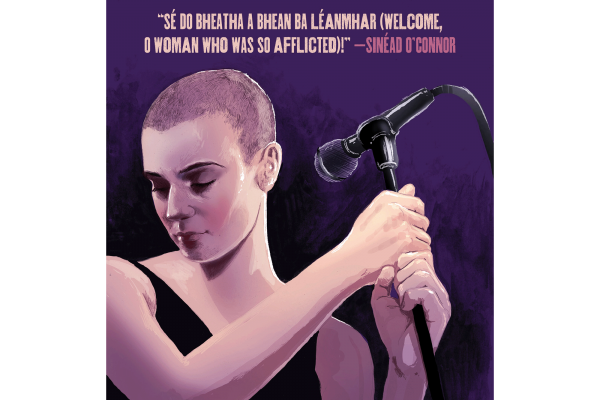The shooting at a Fourth of July parade in Highland Park, Ill., as well as mass shootings earlier this summer in Buffalo, N.Y., and Uvalde, Texas, raise questions about how Christians should respond to gun violence. For many people, including Christians, the answer is legislation — the hope of getting Congress to pass laws that would restrict ownership of guns.
While reducing the prevalence of guns in our society is essential, I am wary of religious gun control efforts that focus primarily on federal gun legislation because laws ultimately rely on frameworks of punitive justice, criminalizing anyone who breaks the law. A holistic approach to gun violence should imagine new alternatives for a safer society — alternatives that go beyond the criminal legal system and gun control laws. To imagine these alternatives, we can turn to the lessons of the transformative justice movement, which seeks to address violence without relying on state violence, police, or prisons.
For many Christians, Romans 13:1–6 is a barrier to our ability to imagine a more just society or build alternatives to the criminal legal system. This famous passage from Paul begins: “Let every person be subject to the governing authorities for there is no authority except from God, and those authorities that exist have been instituted by God.” Many people understand this verse as giving the state “authority” to carry out justice. While this text is complicated, I would argue that we must read it within the context of the surrounding verses (Romans 12:9–13:14).
In this context, the Bible tells Christians to renounce their desire for vengeance: “[D]o not repay anyone evil for evil.” Only God can avenge. Romans 13:1 is intended as a comfort for Christians who are victims of harm and violence: God may sometimes work even through imperfect systems of state power to bring about a kind of justice, or at least redress for harm. Perhaps the promise that God might work through the state is one reason Christians seek gun control legislation to help reduce gun violence. Nevertheless, the “justice” that can be provided through state systems can never provide holistic transformation of violent systems or accomplish healing.
In fact, the police, the courts, and the prison system not only fail to bring about any sort of justice but also do further violence, because policing and prisons are inherently violent institutions. No matter how much we reform sentencing or improve prison conditions, the heart of the prison system is this: the removal of people from their communities and support systems, caging them against their will.
Romans 13:1–6 does not foreclose the possibility of creating alternative transformative justice spaces that exist outside, or even in opposition to, the United States’ “law and order” model. So when considering gun violence and the Christian response, we should follow the lead of transformative justice practitioners by seeking nonviolent solutions beyond what the law can offer.
The transformative justice movement took shape because advocates recognized that the state failed to deliver justice to many of the victims seeking recourse for harm. This was especially the case for those who were marginalized or criminalized because of their identity.
As transformative justice practitioner Mia Mingus describes it, “Transformative Justice (TJ) is a political framework and approach for responding to violence, harm and abuse. … Transformative justice responses and interventions 1) do not rely on the state … 2) do not reinforce or perpetuate violence such as oppressive norms or vigilantism; and most importantly, 3) actively cultivate the things we know prevent violence such as healing, accountability, resilience, and safety for all involved.”
As Mingus notes, TJ can respond to harm by initiating community-based accountability processes, but TJ efforts go beyond accountability to also offer support and healing for survivors and advocate for systemic change that can prevent future violence. Because TJ can take so many forms, groups such as Project Nia and Interrupting Criminalization talk about “one million experiments” for new ways to support communities and prevent and heal from violence. Here’s just one example of what TJ interventions can look like: GoodKids MadCity in Chicago organizes to “provide support to young people affected by shootings while pushing for policies that address social drivers of violence,” providing a safe and supportive space with community activities while also advocating for “more equitable legislation” for their community.
Considering the relevance of TJ approaches to justice, what can TJ teach Christians about activism against gun violence?
First, a TJ framework reminds us to be suspicious of criminalization as a tactic to reduce gun violence. While our immediate emotional response to gun violence may make us want to turn to gun control laws, we must remember laws that criminalize gun possession end up disproportionately affecting Black and other marginalized people. An effective violence prevention strategy rejects increased policing and incarceration, which are forms of violence. Instead, TJ methods that Christians can draw on build community power to change the systemic conditions that lead to gun violence. This means, among other things, resisting arms trading and economic profit from gun sales by leveraging political power to put gun manufacturers out of business. A first step would be organizing to repeal laws giving the gun industry immunity from lawsuits.
Secondly, an effective violence prevention strategy needs to support those most at risk of being harmed by acts of gun violence. This means addressing the connection between mass shootings, white supremacist beliefs, misogyny, and domestic violence. In order for this violence to end, we must address the root causes, including harmful cultural attitudes about race and gender.
Violence prevention requires social support and healing. Christians should look to social support policies that provide housing, food, and money to those in need. In April 2021, the Brennan Center for Justice, a nonpartisan law institute focusing on criminal justice and democracy, conducted a study that found effective interventions against “daily gun violence” need to turn away from criminal penalties and turn toward “address[ing] the root causes of gun violence” by “changing cultural and social norms around violence … promoting prosocial bonds … identifying and supporting victims with the aim of preventing reoccurring violence, mitigating financial stress, and engaging youth.” As they note, all of this requires financial investment in communities.
Third, TJ emphasizes the relational side of violence prevention. My own experience with Circles of Support and Accountability (CoSA) has taught me that we can proactively build socially supportive communities where they don’t naturally exist. CoSA is a restorative-justice prison re-entry and violence prevention model that surrounds someone returning from prison with a supportive community of dedicated volunteers who meet regularly to provide friendship and accountability in a transparent and confidential setting. To prevent gun violence, a social support network might include institutions such as churches, schools, and community groups, as well as intentional community formation through practices similar to CoSA circles. Strong social support networks have the potential to intervene before acts of violence occur.
To engage in relational TJ strategies against gun violence means turning to our own communities, building relationships and communal power at the local level in our congregations and neighborhoods.
In contrast to federal gun legislation, community justice models rely on relationships and building power to effectively transform culture. Restricting our efforts to federal gun laws disempowers us from engaging in other forms of transformative healing. Gun violence prevention is first and foremost violence prevention, and if we advocate for stricter gun laws, then Black and brown people will continue to experience the violence of the criminal legal system.
Federal gun laws, if approached with care to avoid criminalization, may be a helpful form of harm reduction in the current crisis. But just as Christian reliance on the state in Romans 13 is surpassed by the need for alternatives that provide liberation and reconciliation, our response to gun violence should look beyond U.S. law. True transformative work begins in our own communities and from there radically changes society like yeast leavens an entire batch of bread (Matthew 13:33).
Got something to say about what you're reading? We value your feedback!







